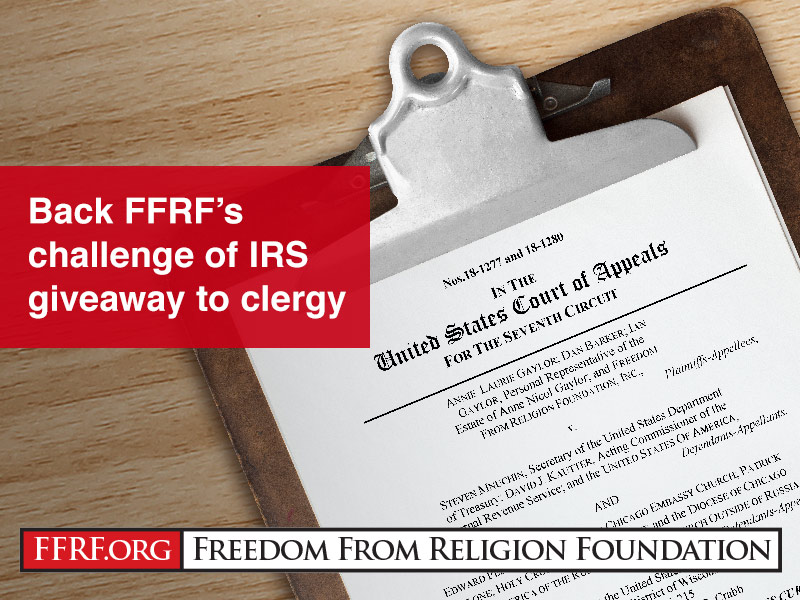
A leading national humanist group is backing the Freedom From Religion Foundation’s legal challenge to a discriminatory religious tax handout.
The Center for Inquiry has filed a brief in support of FFRF’s challenge of a special tax break for clergy, now before the 7th U.S. Circuit Court of Appeals. The housing allowance was passed by Congress in 1954 with a stated intent by its sponsor to reward “ministers of the gospel” for fighting “godlessness.” Church employers may designate part of ministerial salaries as “housing allowances,” which may then be subtracted from the minister’s taxable income. The generous provision permits ministers to exempt rent, mortgage interest, utilities, repairs and many other home expenses.
The tax break “provides a significant financial benefit available only to certain employees based purely on their religious status,” states the Center for Inquiry brief. “Religious organizations which do not employ ‘ministers of the gospel,’ may not offer this benefit. Nonreligious employers, even if identical in every other way to a church, may not offer this benefit. The law therefore discriminates ‘between religion and religion, and between religion and nonreligion,’” to quote the U.S. Supreme Court.
The legal document makes convincing points for abolishing this tax allowance.
“It defies reason to claim that requiring ministers to obey the same rules as other employees could be seen as discriminatory,” states the brief, adding: “It is hard to see how the government could send a clearer message of endorsement than the grant of billions of dollars of tax benefits to ministers of the gospel alone.”
The Center for Inquiry skillfully demolishes the contention that abolishing the tax break would diminish charitable work on part of religious organizations.
“Even if this were to be the case, it would not justify granting a preference to religious groups that remains unavailable to nonreligious ones,” the brief maintains. “Moreover, there is no way of knowing whether religious congregations effectively and generously fulfil this charitable mission. Indeed, that evidence which does exist suggests churches are no more generous than secular groups, and may indeed use significantly less of the money they raise for such purposes.”
The brief persuasively clarifies the financial and constitutional damage to ordinary citizens due to this unjustified tax handout.
“For every extra $111 a month that a minister can reduce his tax bill, secular employees must pay an extra $111 a month in taxes for the government to break even,” it asserts. “This tax break to religion is therefore, in a very real sense, a tax increase on secular individuals. The parsonage exemption thus goes against the bedrock of the First Amendment, and violates Thomas Jefferson’s stricture that ‘no man shall be compelled to frequent or support any religious worship, place or ministry whatsoever.’”
FFRF has designated a housing allowance for its executive directors, Annie Laurie Gaylor and Dan Barker, arguing they are similarly situated to clergy as leaders of a nontheistic organization. Contending the housing allowance is both unconstitutional and discriminatory, FFRF went to court, winning a resounding victory at the district court level in 2013. The 7th Circuit threw out the case the following year, contending Barker and Gaylor first needed to apply for a refund and be denied one before being able to sue. When the couple actually applied and were refused the refund, they and FFRF went back to court, again winning a firm ruling in federal court last year. Once again, the Treasury Department and IRS have appealed the lower court ruling.
FFRF’s challenge has unleashed a numbing list of legal adversaries — mostly Religious Right legal groups and religious denominations — all loudly insisting that clergy deserve and must be given a unique housing tax break. This is more the reason that FFRF is thankful to have a prominent humanist organization make its case so compellingly for it.
“Pitted as we are against such an array of religious groups, we are grateful to get well-reasoned support from a like-minded group,” says Gaylor.
Gaylor v. Lew has appellate case numbers 18-1277 and 18-1280. FFRF is represented by outside counsel Richard L. Bolton. The Center for Inquiry brief is written by Nicholas Little, the organization’s legal director.

